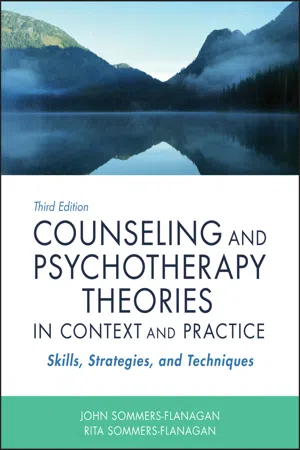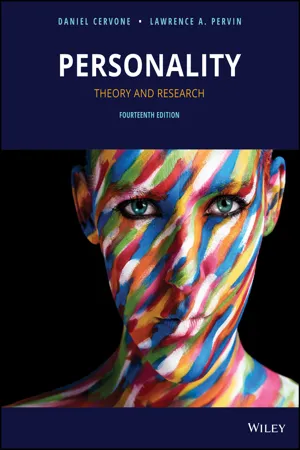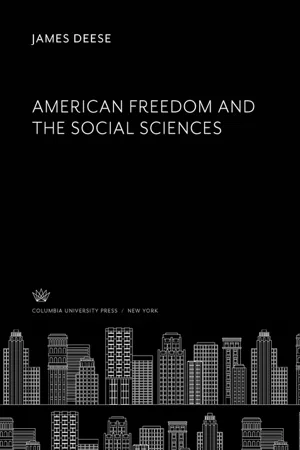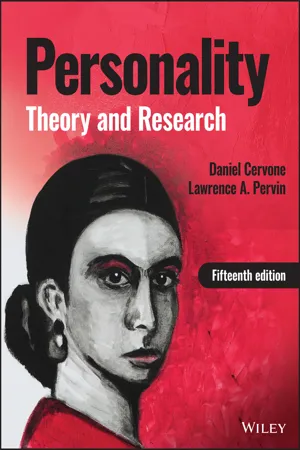Psychology
Behaviorism
Behaviorism is a psychological theory that focuses on observable behaviors rather than internal mental processes. It emphasizes the role of environmental stimuli in shaping and controlling behavior, and it often uses conditioning techniques to modify behavior. Behaviorism has had a significant influence on areas such as learning theory and therapy.
Written by Perlego with AI-assistance
Related key terms
1 of 5
10 Key excerpts on "Behaviorism"
- eBook - PDF
Educational Psychology Reader
The Art and Science of How People Learn - Revised Edition
- Greg S. Goodman(Author)
- 2013(Publication Date)
SECTION II Behaviorism Behaviorism has had a profound impact in a number of disciplines including psychology, clinical ther- apy, educational research, and instructional design (Driscoll, 2005). As the first theory that was applied directly to educational settings to facilitate teaching, Behaviorism is an extremely important theory in the education field. It was the most dominant theory in American educational psychology between the 1920s and the 1960s and still has tremendous impact on educational practices today. However, Behaviorism has been criticized by many researchers, teachers, administrators, and policy- makers. The purpose of this chapter is threefold: 1) to develop a correct understanding of behavior- ism, 2) to objectively and critically evaluate its effect on learning, and 3) to provide practical guidelines on its applications in school settings. This chapter is divided into two sections. The first provides an overview of Behaviorism, e.g., its history and some key concepts. The second broadly evaluates its effects, both positive and nega- tive, on education. The second part also includes practical guidelines on the applications of behav- iorism in actual school and classroom environments. It is my sincere hope that this chapter will help the readers not only develop a deep understanding of Behaviorism but also walk away with practi- cal strategies and methods. OVERVIEW OF Behaviorism CLASSICAL CONDITIONING BY PAVLOV Behaviorism began with the Russian psychologist Pavlov and his famous dog salivation experiment in the 1890s. In his experiment, Pavlov and his laboratory staff first presented food to the dog and found that the dog actually started the act of salivating before eating the food. When an actual stimulus itself (e.g., food) causes some action in animals or humans, the stimulus is called an unconditioned stimulus. Inspired by this discovery, Pavlov and his staff designed another experiment. - eBook - PDF
- Paul Thagard(Author)
- 2018(Publication Date)
- Princeton University Press(Publisher)
Cognitive psychology has local theo- ries that postulate nonobservable representations and information-processing mechanisms to explain experimental results; the results explained are more commonly called "effects" than generalizations. But no precise theory that serves to unify and explain a wide range of experimental results has emerged. In looking at Behaviorism and cognitivism, we will see important conceptual changes, even in the absence of unifying explanatory theories. Of particular interest will be the relation between Behaviorism and cognitivism, and the relation each has to the commonsense psychology of ordinary people. 9.2 Behaviorism 9.2.1 The Development of Behaviorism 1 An early textbook by a prominent American psychologist gives the flavor of the approach to psychological research against which the behaviorists re- belled. "Psychology is commonly defined as the science of consciousness 1 A fuller historical account would discuss many matters omitted here. Historians of psychol- ogy distinguish the "structuralist" approach of Wundt and Titchener, whose goal was to discover 228 C H A P T E R 9 Mental facts, or facts of consciousness, constitute the field of psychology .... The fundamental psychological method is introspection As a psychologi- cal method it consists simply in the direct examination of one's own mental processes" (Angelí 1908,1-5). The founder of Behaviorism, J. B. Watson, did his early research with animals, particularly rats running mazes. He inverted the introspectionist's transfer of notions of consciousness to animals by deny- ing that the topic of consciousness is relevant even to the psychology of hu- mans. In his original manifesto, "Psychology as the Behaviorist Views It," he advocated the "elimination of states of consciousness as proper objects of investigation" (Watson 1913, 177). - eBook - PDF
Counseling and Psychotherapy Theories in Context and Practice
Skills, Strategies, and Techniques
- John Sommers-Flanagan, Rita Sommers-Flanagan(Authors)
- 2018(Publication Date)
- Wiley(Publisher)
In addition, behaviorists use ther-apy techniques derived from scientific research, whereas psychoanalytic techniques are rooted in clinical practice. However, both perspectives are highly mechanistic, positivistic, and deterministic approaches to under-standing humans. These similarities led the late Michael Mahoney, an influential behavior therapist, to refer to 168 CHAPTER 7 BEHAVIORAL THEORY AND THERAPY psychoanalysis and Behaviorism as the “yin and yang” of determinism (Mahoney, 1984). For behaviorists, human learning is the crucible through which complex human behaviors develop. New learning (or behavior modification) is the behavior-ist’s tool for creating therapeutic change. This chapter explores the history and application of scientific behav-iorism and behavior therapy. KEY FIGURES AND HISTORICAL CONTEXT Behavioral approaches to human change came in three major stages: 1. Behaviorism as a scientific endeavor. 2. Behavior therapy approaches. 3. Cognitive behavior therapy. Behaviorism In the early 1900s, North American scientific psy-chology was on the move. Led by the ambitious John B. Watson, a new and dif-ferent view of humans was becoming popular. This view, dubbed Behaviorism , was in stark contrast to prevail-ing perspectives. Most early twentieth century academic psychologists were using introspection (the subjective observation of one’s own mental state) to study human consciousness. In contrast, behaviorists rejected subjec-tive introspection, focusing instead on objective observa-tions. They also believed in determinism, rather than free will (Watson, 1913). Prior to Watson, William James, the innovative thinker credited with launching psychology as an academic dis-cipline, was more comfortable as a philosopher than as a scientist. - eBook - PDF
Personality
Theory and Research
- Daniel Cervone, Lawrence A. Pervin(Authors)
- 2018(Publication Date)
- Wiley(Publisher)
This is the strategy adopted by the behaviorist. Table 10.1 summarizes the basic points of emphasis in Behaviorism that we have reviewed. With this background, we now begin our coverage of theories that were developed within this behavioral approach to psychological science. Specifically, we start where the approach itself began histori- cally, with the ideas of John Watson and the associated research contributions of Ivan Pavlov. Watson, Pavlov, and Classical Conditioning Watson’s Behaviorism John B. Watson (1878–1958) was the founder of the approach to psychology known as behavior- ism. He began his graduate study at the University of Chicago in philosophy and then switched to psychology. He took courses in neurology and physiology and began to do biological research with animals. During the year before he received his doctorate, Watson had an emotional break- down and had sleepless nights for many weeks. He described this period as causing him to become interested in the work of Freud (Watson, 1936, p. 274). He eventually completed his dis- sertation, which caused him to develop a particular attitude regarding the use of human subjects: At Chicago, I first began a tentative formulation of my later point of view. I never wanted to use human subjects. I hated to serve as a subject. I didn’t like the stuffy, artificial instructions given to subjects. I always was uncomfortable and acted unnaturally. With animals I was at home. I felt that, in studying Table 10.1 Basic Points of Emphasis of Learning Approaches to Personality 1. Empirical research is the cornerstone of theory and practice 2. Personality theory and applied practice should be based on principles of learning 3. Behavior is responsive to reinforcement variables in the environment and is more situation specific than suggested by other personality theories (e.g., trait, psychoanalytic) 4. - eBook - PDF
History of Modern Psychology
A Global Perspective
- C. James Goodwin(Author)
- 2023(Publication Date)
- Wiley(Publisher)
So not all the research during the heyday of Behaviorism involved rats in mazes or pigeons in Skinner boxes. In the opening paragraph of his book on the alleged mid-20th century cognitive revolution in psychology, Baars (1986) made the observation that Behaviorism “is often referred to in the past tense” (p. 1) and that not too many psychologists refer to themselves as behaviorists anymore. There is a grain of truth to this assertion—as we will learn in Chapter 11, Behaviorism with a capital “B” has been on the wane for decades, and cognitive psychology, which returned the study of mental processes to scientific respectability, has to a certain extent replaced Behaviorism as American psychology’s predominant conceptual framework. Yet Baars’s assertion overstates the case. It overlooks the fact that research on learning and conditioning continues to occur at virtually every major university in America, and that behavioral principles continue to form the basis for many successful applications (e.g., behavior therapy). More important, and as an indication of just how influential Behaviorism has been, the central message of Behaviorism is now taken for granted by every research psychologist. That is, regardless of whether researchers consider themselves “behaviorists,” they all are careful to operationally define psychological concepts in behavioral terms, and even if they are interested in internal, unobservable processes (e.g., insight in problem solving), they limit their evidence to behavioral phenomena (e.g., solutions to problems). Furthermore, I know of no introductory textbook that fails to include the term behavior in its definition of psychology. Baars recognized this himself in the preface to his book, writing that, in the sense just described, “we are all behaviorists” (p. ix). SUMMARY 373 NeoBehaviorism had its genesis in the urgent need to analyze human cognition and relate it to behavior, especially for creating a long-lasting meaning with application. - eBook - PDF
- James Deese(Author)
- 2019(Publication Date)
- Columbia University Press(Publisher)
Chapter Five The Ethos of Contemporary Psychology: I. Behaviorism I n the next three chapters I examine three represen-tative aspects of modern psychology: Behaviorism, experimental social psychology, and psychohistory. These by no means exhaust the astounding range of psychology today, but they are representative respectively of hardheadedness in psychology, the experimental intrusion into real life, and the detailed analy-sis of a single individual's personality. All three of these illustra-tions serve as examples of a misplaced faith in psychological determinism This chapter is devoted mainly to Behaviorism and specifically to the Behaviorism of B. F. Skinner and his school. Experimental Psychology Both Behaviorism and contemporary social psychology owe their primary methodological allegiance to experimentation. I have, in earlier chapters, commented on aspects of psychology's devotion 102 Behaviorism to experimentation as the method of choice, but before I can deal with these two representative aspects of modern psychology, I must make explicit certain views that I hold about the experimen-tal method in psychology The nineteenth-century notion—that is to say Wilhelm Wundt's—of experimentation in psychology bears almost no re-semblance to the late twentieth century's view of it. Brass instru-ments, the Hipp Chronoscope, and introspection have given way to animals, the computer, and the observance of behavior. What, however, has remained unchanged over the intervening century is the faith that psychology is a kind of natural science, that is to say the faith that all of the great tools of the physical sciences are at the service of psychology. Among these tools is experimentation. The ability to tease out physical variables, change them, and then observe what happens to other physical variables is the empirical basis for causative inference. - eBook - PDF
Personality
Theory and Research
- Daniel Cervone, Lawrence A. Pervin(Authors)
- 2022(Publication Date)
- Wiley(Publisher)
The behaviorists, then, stimulated the thinking of most of the theorists discussed in the remain- ing chapters of this book. Each of these theorists was intimately familiar with the behaviorists’ claims and was skeptical about those claims. This skepticism motivated them to provide alterna- tive approaches to the study of personality, as you will see in the chapters ahead. Table 9.2 Summary of Strengths and Limitations of Learning Approaches Strengths Limitations 1. Committed to systematic research and theory development 2. Recognizes the role of situational and environmental variables in influencing behavior 3. Takes a pragmatic approach to treatment, which can lead to important new developments 1. Oversimplifies personality and neglects important phenomena 2. Lacks a single, unified theory 3. Requires further evidence to support claims of treatment effectiveness 281 Critical Evaluation M A J O R C O N C E P T S ABA research design ABC assessment Behavioral assessment Behaviorism Classical conditioning Conditioned emotional reaction Counterconditioning Determinism Discrimination Extinction Fixed Functional analysis Generalization Generalized reinforcers Maladaptive response Operant conditioning Operants Punishments Reinforcer Sample approach Schedule of reinforcement Shaping Sign approach Situational specificity Successive approximations Systematic desensitization Target behaviors or target responses Token economy Variable R E V I E W 1. The school of thought known as Behaviorism promoted a learning approach to personality. The learning approach sug- gests that the patterns of social behavior that we see as indica- tions of an individual’s personality are learned through envi- ronmental experience. 2. Pavlov’s work on classical conditioning, combined with Wat- son’s extension of this work to humans in the case of Little Albert, provided the first foundation for a behavioral approach to the study of persons. - eBook - PDF
- Duane Schultz(Author)
- 2013(Publication Date)
- Academic Press(Publisher)
Comment This vigorous attack on the old psychology and the call for a dramatic new approach was a stirring appeal to many psychologists. Consider the major points. Psychology is to be the science of behavior (and not the introspective study of consciousness)—a purely objective experi-mental branch of natural science. Both human and animal behavior will be investigated. The new psychology will discard all mentalistic concepts, and use only behavior concepts such as stimulus and response. The goal of psychology is the prediction and control of behavior. As we have seen, these points were not new with Watson. Objective experimental methods had been employed for some time, and functional concepts had certainly been highly influential, indeed, dominant, in America. Research on animal learning had begun to yield data applicable to human learning, and objective tests had been developed and used with some success to predict and control behavior. Even Watson's defini-tion of psychology as the science of behavior had been anticipated. Thus, Watson's positive points were not new. What was unique and provocative about his program was his pronounced negative emphasis— drop the mind and consciousness, do away with mentalistic concepts, stop speculating about what might be occurring in the brain, and stop using introspection. He was a breath of fresh air, clearing away the musty accumulation of the centuries [R. I. Watson, 1971, p. 442]. The Methods of Behaviorism As Watson stated, only objective methods of investigation are admissi-ble in the behavioristic laboratory. Watson stated quite explicitly the methods to be used in research: (a) observation, with and without the use of instruments, {b) the conditioned reflex method, {c) the verbal report method, and {d) testing methods. The method of observation, self-explanatory and fundamental, is a necessary basis for the other methods. - eBook - PDF
- Per Saugstad(Author)
- 2018(Publication Date)
- Cambridge University Press(Publisher)
Even if the majority of psychologists at the beginning of the twenty-first century seem to concentrate on the study of mental phenomena, most probably include the study of behavior in their definition of psychology, seeing it as the study of consciousness and behavior. There may be several reasons for this change, but Watson’s efforts to show that psychology could be seen as the study of behavior was probably one. Operationalism In the empirical sciences we compile information in order to substantiate assertions and clarify concepts. To procure information, we must employ different procedures, such as making particular forms of observations with the help of specific techniques, and conduct experiments of different kinds. Thus, there is a close relationship between the procedures we use, the operations we perform, and the meaning of the concepts we employ to create coherence in knowledge. This implies that in order to clarify the mean- ing of a concept, we should analyze it in relationship to the procedures we are using. In 1927, a distinguished US physicist, Percy Bridgman, wrote a book in which he argued that the meaning of concepts could and must be completely definable with refer- ence to the operations the researchers had used to give them empirical content. In other words, he attempted to raise an important form of scientific practice to the level of a general principle. His approach was called operationalism. Some of his colleagues immediately objected that if Bridgman’s contention were cor- rect, it was difficult to understand how we could decide one procedure is better than another, a decision researchers often make. Examinations of theoretical concepts by philosophers of science also showed that these were incorporated into contexts that could not be described only with reference to research procedures. Thus, it was not pos- sible, as Bridgman had thought, to define theoretical concepts exclusively by reference to the operations scientists performed. - eBook - PDF
- William O'Donohue, Richard Kitchener(Authors)
- 1998(Publication Date)
- Academic Press(Publisher)
The same motor pattern can be a threat, a formal signal, an apparently irrelevan t accompaniment of some other action, or many other things . As Skinner, as wel l as countless critics of Behaviorism, have tirelessly pointed out, behavior must b e defined in some more general way if distinctions like these are not to be lost . Skinner's suggestion was to group together all acts with a common reinforcin g consequence, which is an improvement over raw physical description, but stil l teleological and still insufficient to explain, for example, why one organism de-velops one repertoire under a set of reinforcement contingencies and behave s afterward in one way whereas another develops a different set or behaves in a different way afterward . History, and its effects on the organism, must be cap-tured in some theoretical way . 2. Skinner, like many other psychologists, agreed that the findings of psy-chology provide what is to be explained by neurophysiology, just as the law s of chemistry are, ultimately, to be explained by physics . Since behavior, physi-cally defined, is intrinsically ambiguous, it cannot provide that which is to b e explained by neurophysiology. What neurophysiology must explain is what th e organism is doing—what kind of a machine it is . It follows that the behaviorist' s aim must be to arrive at an accurate dynamic model . It is in this sense that th e model is the behavior the model is what neurophysiology must explain, no t behavior tout court . How does theoretical Behaviorism differ from cognitivism? Both are theoreti-cal and both assume internal states . One difference is that theoretical behavior -ism is explicitly historical and dynamic (see Fig . 9 .1) . It is not concerned di-rectly with representation, a core issue for cognitivists, but with the way that th e organism is changed by its experience . A second difference is that theoretical be-haviorism makes no presumptions about either its subject matter or its theoreti-cal constructs .
Index pages curate the most relevant extracts from our library of academic textbooks. They’ve been created using an in-house natural language model (NLM), each adding context and meaning to key research topics.









